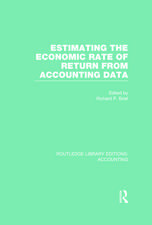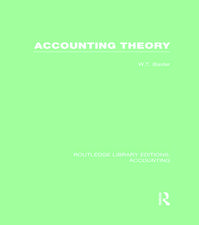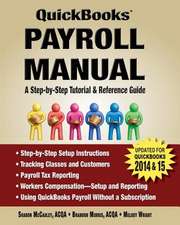Accounting by the First Public Company: The Pursuit of Supremacy: Routledge New Works in Accounting History
Autor Warwick Funnell, Jeffrey Robertsonen Limba Engleză Paperback – 8 iun 2018
This study examines the contributions of accounting to the remarkable success of the Dutch East-India Company and the influences on these accounting practices. From the time that the German economic historian Werner Sombart proposed that accounting techniques, most especially double-entry bookkeeping, were critical to the development of modern capitalism and the public company, historians and accounting scholars have debated the extent and importance of these contributions. The Dutch East-India Company was a capitalistic enterprise that had a public, permanent capital and its principal objective was to continually increase profit by reinvesting its returns in the business. Rather than the organisation and management of the Dutch East-India Company reflecting the perceived benefits of a particular bookkeeping method, the supremacy that it achieved and maintained in a very hazardous business at a time of recurring conflict between European states was a consequence of the practicalities of 17th century business and The Netherlands’ unique, threatening natural environment which shaped its social and political institutions.
| Toate formatele și edițiile | Preț | Express |
|---|---|---|
| Paperback (1) | 305.10 lei 6-8 săpt. | |
| Taylor & Francis – 8 iun 2018 | 305.10 lei 6-8 săpt. | |
| Hardback (1) | 847.34 lei 6-8 săpt. | |
| Taylor & Francis – 12 noi 2013 | 847.34 lei 6-8 săpt. |
Din seria Routledge New Works in Accounting History
-
 Preț: 364.91 lei
Preț: 364.91 lei -
 Preț: 433.30 lei
Preț: 433.30 lei -
 Preț: 493.80 lei
Preț: 493.80 lei - 18%
 Preț: 262.35 lei
Preț: 262.35 lei - 16%
 Preț: 338.33 lei
Preț: 338.33 lei -
 Preț: 372.26 lei
Preț: 372.26 lei - 13%
 Preț: 306.56 lei
Preț: 306.56 lei -
 Preț: 408.54 lei
Preț: 408.54 lei -
 Preț: 449.41 lei
Preț: 449.41 lei -
 Preț: 449.41 lei
Preț: 449.41 lei - 15%
 Preț: 457.76 lei
Preț: 457.76 lei -
 Preț: 333.59 lei
Preț: 333.59 lei - 24%
 Preț: 320.74 lei
Preț: 320.74 lei - 17%
 Preț: 166.59 lei
Preț: 166.59 lei - 15%
 Preț: 454.68 lei
Preț: 454.68 lei - 18%
 Preț: 1348.33 lei
Preț: 1348.33 lei - 16%
 Preț: 262.14 lei
Preț: 262.14 lei - 13%
 Preț: 307.62 lei
Preț: 307.62 lei -
 Preț: 318.44 lei
Preț: 318.44 lei -
 Preț: 324.99 lei
Preț: 324.99 lei -
 Preț: 449.41 lei
Preț: 449.41 lei -
 Preț: 436.14 lei
Preț: 436.14 lei -
 Preț: 411.42 lei
Preț: 411.42 lei - 19%
 Preț: 216.07 lei
Preț: 216.07 lei - 19%
 Preț: 216.07 lei
Preț: 216.07 lei - 20%
 Preț: 105.93 lei
Preț: 105.93 lei - 17%
 Preț: 331.70 lei
Preț: 331.70 lei -
 Preț: 466.29 lei
Preț: 466.29 lei -
 Preț: 389.38 lei
Preț: 389.38 lei -
 Preț: 449.41 lei
Preț: 449.41 lei -
 Preț: 436.14 lei
Preț: 436.14 lei
Preț: 305.10 lei
Preț vechi: 351.93 lei
-13% Nou
Puncte Express: 458
Preț estimativ în valută:
58.39€ • 63.40$ • 49.05£
58.39€ • 63.40$ • 49.05£
Carte tipărită la comandă
Livrare economică 22 aprilie-06 mai
Preluare comenzi: 021 569.72.76
Specificații
ISBN-13: 9781138616769
ISBN-10: 1138616761
Pagini: 224
Ilustrații: 4 Line drawings, black and white; 21 Halftones, black and white; 7 Tables, black and white; 25 Illustrations, black and white
Dimensiuni: 152 x 229 x 21 mm
Greutate: 0.72 kg
Ediția:1
Editura: Taylor & Francis
Colecția Routledge
Seria Routledge New Works in Accounting History
Locul publicării:Oxford, United Kingdom
ISBN-10: 1138616761
Pagini: 224
Ilustrații: 4 Line drawings, black and white; 21 Halftones, black and white; 7 Tables, black and white; 25 Illustrations, black and white
Dimensiuni: 152 x 229 x 21 mm
Greutate: 0.72 kg
Ediția:1
Editura: Taylor & Francis
Colecția Routledge
Seria Routledge New Works in Accounting History
Locul publicării:Oxford, United Kingdom
Public țintă
Postgraduate and UndergraduateCuprins
Timeline Figures Acknowledgements Preface 1. Introduction 2. Dutch Identity and the Influence of Landscape 3. Netherlands’ Trade and Commerce 4. Dutch Bookkeeping and the Hanseatic Influence 5. The Dutch East-India Company 6. Accounting for Capital 7. The VOC’s General Bookkeeping: Contradictions and Conflict 8. Conclusion Bibliography
Descriere
The United Dutch East India Company was the first public company, preceding the formation of the English East-India Company by over 40 years. Its fame as the first public company which heralded the transition from feudalism to modern capitalism and its remarkable financial success for nearly two centuries ensure its importance in the history of capitalism. This study examines the contributions of accounting to the remarkable success of the Dutch East-India Company and the influences on these accounting practices.



















